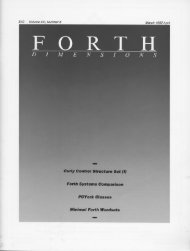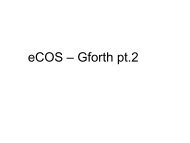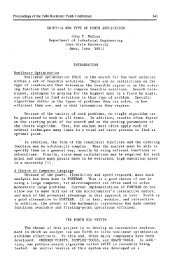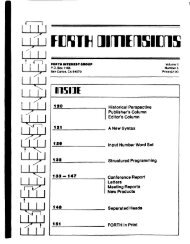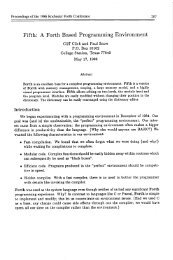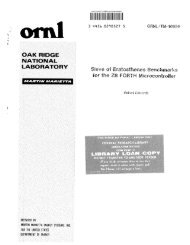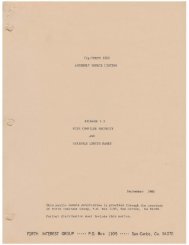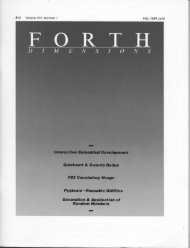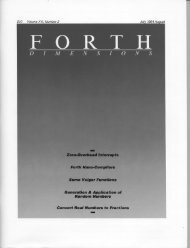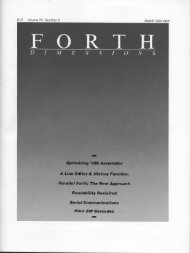2 - Forth Interest Group
2 - Forth Interest Group
2 - Forth Interest Group
Create successful ePaper yourself
Turn your PDF publications into a flip-book with our unique Google optimized e-Paper software.
Pinhole Optimization<br />
Wil Baden<br />
Costa Mesa, California<br />
The performance of compiled programs can be greatly<br />
improved by a little bit of optimization. One standard<br />
technique is "peephole optimization." In peephole opti-<br />
mization, the compiler's output is examined for sequences<br />
of operations that can be replaced by more efficient<br />
sequences.<br />
This is the approach taken in Tom Almy's <strong>Forth</strong>CMP,<br />
Xan Gregg's "PowerMac<strong>Forth</strong> Optimizer" (FD XVI/6),<br />
Charles Curley's "Optimization Considerations" (FD XIV/<br />
5), and David M. Sanders' "Optimizing '386 Assembly<br />
Code" (FD XV/6).<br />
In those systems, the implementation is subroutine<br />
threaded or compiled machine language. The implemen-<br />
tations are all specific to particular hardware.<br />
Peephole optimization for a direct token-threaded or<br />
indirect token-threaded implementation can be provided<br />
by having the text interpreter remember the words most<br />
recently encountered when compiling. Only the execu-<br />
tion token or compilation token of words needs to be<br />
remembered. The compiler knows what it did with them.<br />
For practicality, only the last three operations will be<br />
remembered.<br />
Just the two previous execution tokens have to be<br />
remembered.<br />
This can be done by extending the standard word<br />
COMPILE, or equivalent in your system.<br />
VARIABLE last<br />
VARIABLE penult<br />
: COMPILE, ( execution-token -- )<br />
last @ penult !<br />
DUP last !<br />
( Old Definition of COMPILE, )<br />
COMPILE ,<br />
f<br />
I call this narrow-window approach to optimization<br />
pinhole optimization.<br />
In traditional implementations of <strong>Forth</strong>, an immediate<br />
word has at most one execution token or compilation<br />
token associated with it. That is, IF may have OBRANCH,<br />
. " may have ( . " ) , LITERAL may have do-LITERAL.<br />
These tokens may have different names in your system,<br />
are often headerless, not found in a wordlist, and known<br />
only to the compiler.<br />
With pinhole optimization, such words may have more<br />
than one execution or compilation token. The appropriate<br />
one will be selected by the optimization logic. Previously<br />
compiled tokens may be replaced.<br />
Pinhole optimization extends the number of immediate<br />
words. Words that will benefit by being combined with<br />
words that have just been compiled are made smart.<br />
Execution tokens are provided for secret words written in<br />
low-level <strong>Forth</strong>.<br />
As an example of one possibility, some systems have<br />
-ROT equivalent to ROT ROT. With pinhole optimization,<br />
-ROT may not have a name in any dictionary, but when<br />
ROT is encountered by the text interpreter in compilation<br />
state, it looks to see if the previous word was ROT; if so,<br />
it replaces the compilation token of ROT with the compilation<br />
token of the secret word -ROT.<br />
Other examples are not so straightforward, and replacement<br />
words usually don't have a meaningful name.<br />
Pinhole optimization is most useful with literals and<br />
logic.<br />
When the text interpreter encounters a literal in a<br />
definition, it puts out do-LITERAL, or whatever your<br />
system calls it, followed by the binary value of the literal.<br />
When the definition is executed, do-LITERAL will take<br />
the binary value following it, and push it onto the stack.<br />
With pinhole optimization, if the literal is followed by<br />
+, do-LITERAL will be replaced with do-LITERAL-PLUS.<br />
When the definition is executed, do-LITERAL-PLUS<br />
will take the binary value following it, and add it to the top<br />
element of the stack.<br />
This roughly halves the time it takes to add a literal.<br />
In a traditional implementation, 0- IF or O= UNTIL<br />
will generate two tokens, that might be called<br />
do-ZERO-EQUAL do-BRANCH-IF-ZERO, followed by<br />
a destination. FALSE = IF or FALSE = UNTIL will<br />
generate three tokens followed by a destination. With<br />
pinhole optimization, they will all generate one token,<br />
do-BRANCH-UNLESS -ZERO, followed by a destination.<br />
Pinhole optimization would also look for DUp and<br />
<strong>Forth</strong> Dimensions 29 July 1995 August



